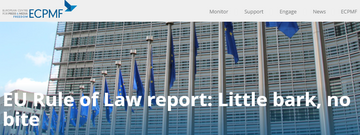
28 July 2021
On 20 July, the European Commission published the 2021 Rule of Law Report. The document, which is the outcome of months of painstaking work, can be a valuable tool that empowers civil society, the EU institutions and Member State governments who care about the rule of law in the Union. The Report, comprised of a Communication that covers EU-wide developments and country chapters for each Member State, is designed “as a yearly cycle to promote the rule of law and to prevent problems from emerging or deepening and to address them ... It seeks to strengthen the rule of law in full respect for national traditions and specificities, stimulating a constructive debate and encouraging all Member States to examine how challenges can be addressed and to learn from each other’s experiences.”
In its current form, the Report represents a significant descriptive documentation effort. However, for it to live up to the high expectations and truly become a critical tool that can contribute to the promotion and safeguarding of EU values, we believe several fundamental changes are needed in future iterations of the report.
Firstly, we believe that more transparency from the Commission on the methodology and selection process of stakeholders invited to consultation meetings, as well as closer consultation and collaboration with civil society to design a more straightforward and more easily accessible process, would greatly benefit its credibility. We appreciate that the Commission has “further deepened our assessment, which benefited from even more outreach than last year,” as Commissioner Reynders said at the press conference presenting the Report. However, given the current lack of openness concerning the methodology, it is difficult to assess how inclusive the process really is and to what extent shortcomings in this regard are systematically addressed.
Secondly, looking at the Communication and country reports as a whole, it appears that the process of “looking at all Member States equally” has resulted in depoliticised analyses in anodyne language that present the situation in all Member States as roughly equal, allowing for measured praise and criticism of each. Subsequently, we believe that the Report as a whole does not reflect the reality of the depth of the rule of law crisis in Poland and Hungary or how starkly the intentional violation of core EU values in these Member States contrasts with the situation in the rest of the Union. It also undermines the Report’s ability to prevent problems from emerging, as is currently the case in certain other Member States including Slovenia, or to stimulate debate and mutual learning.
Lastly, to strengthen the process’ capacity to bring about substantial change, we continue to call for country-specific recommendations. These should be framed in the context of Member States’ obligations under EU law and international human rights law and standards, which would allow for tracking and evaluating progress and regression against an agreed, binding framework.
Signed:
ARTICLE 19
European Centre for Press and Media Freedom (ECPMF)
European Federation of Journalists (EFJ)
Free Press Unlimited (FPU)
International Press Institute (IPI)
OBC Transeuropa (OBCT)
Tags: European policies and legislation Media freedom Media pluralism Rule of Law
This content is part of the Media Freedom Rapid Response (MFRR), a Europe-wide mechanism which tracks, monitors and responds to violations of press and media freedom in EU Member States and Candidate Countries. The project is co-funded by the European Commission.


